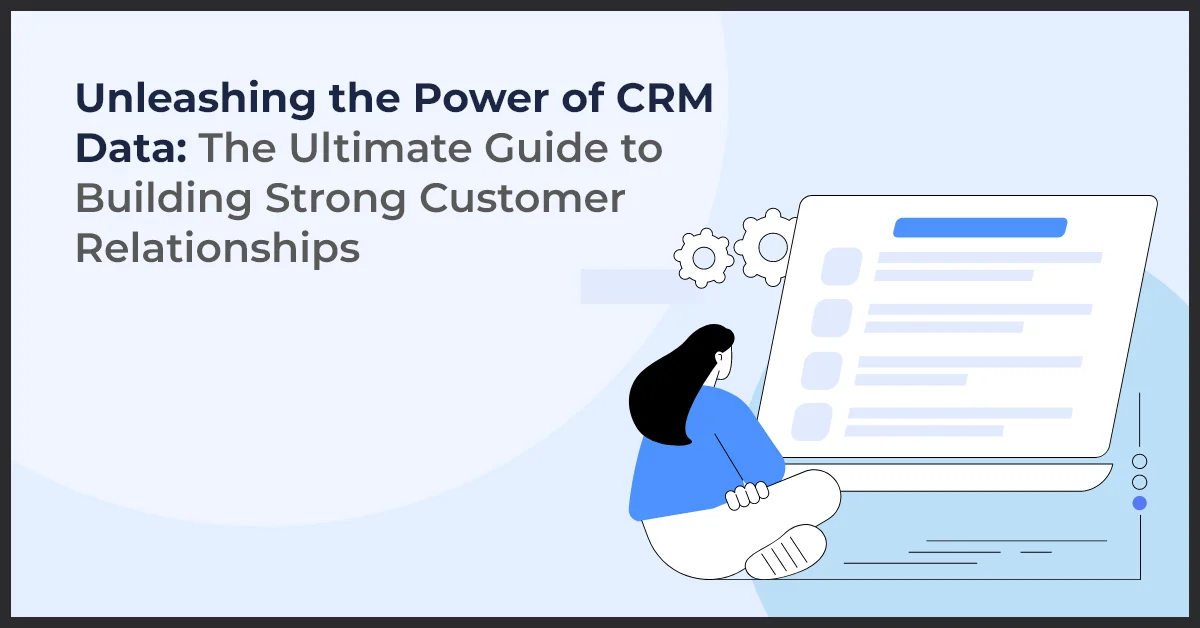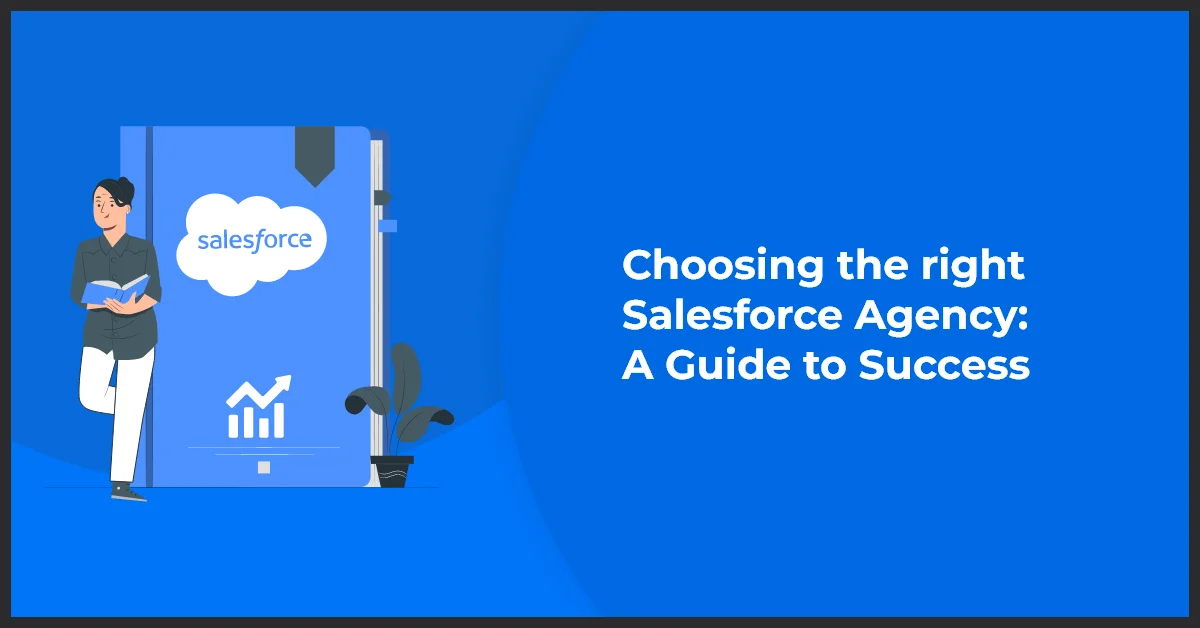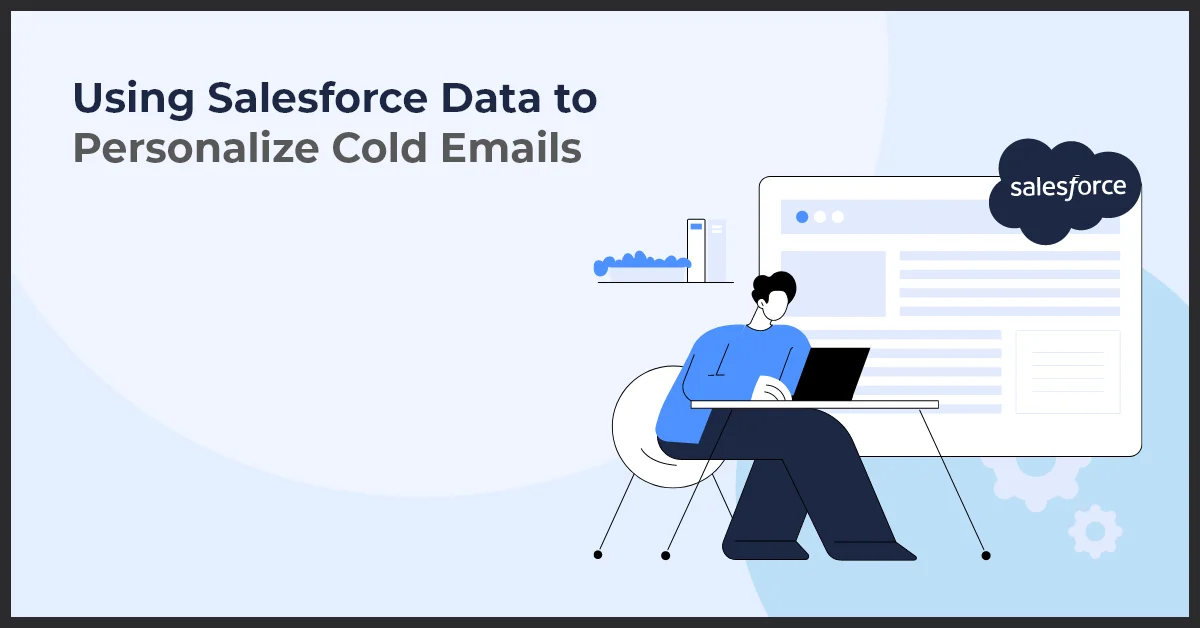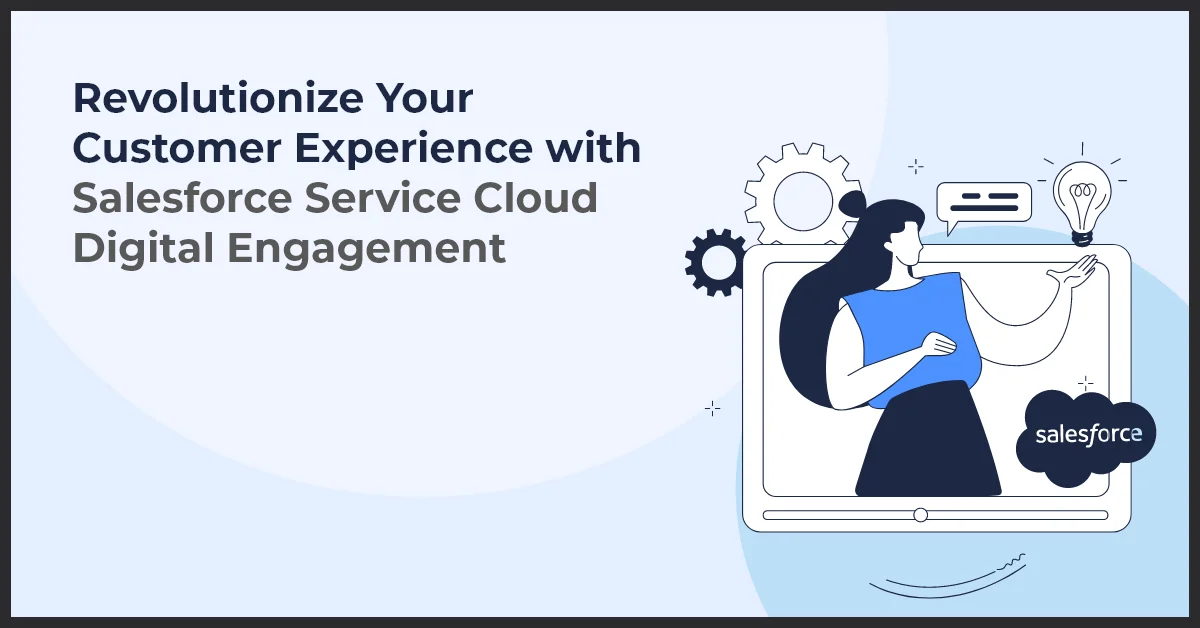Unleashing the Power of CRM Data: The Ultimate Guide to Building Strong Customer Relationships

Published on: October 23, 2023
Updated on: September 11, 2024
2177 Views
- Salesforce
18 min read
Are you ready to transform your relationship management game with the power of CRM data? In today's increasingly competitive business landscape, leveraging customer relationship management (CRM) data has become essential for driving growth and cultivating long-lasting customer relationships.
So, let us explore the various types of CRM data, including customer profiles, interactions, and preferences, and how these insights can personalize your marketing efforts, improve customer satisfaction, and maximize revenue.
Get ready to discover expert strategies and best practices for harnessing the potential of CRM data. From data collection and integration to data analysis and actionable insights, we will guide you through every process step, empowering you to make informed business decisions and establish stronger customer connections.
Understanding CRM Data
To fully grasp the power of CRM (Customer Relationship Management), it's essential to understand the significance of CRM data. This valuable asset provides businesses with invaluable insight into their customers, sales, marketing, and more. Let's dive deeper into the world of CRM data.
Definition and Significance of CRM Data
CRM data refers to the information stored within a CRM system that provides insights about customers, sales, marketing strategies, and other relevant aspects of a business. It holds immense importance as it serves as the backbone of the CRM system, driving decision-making processes and enabling businesses to understand their customers better.
Types of Data Involved in CRM Systems
A CRM system typically encompasses various types of data, including customer, sales, marketing, and service data. Customer data includes demographics, purchase history, and communication preferences
Sales data tracks the sales pipeline and records deals closed while marketing data focuses on campaign effectiveness and lead generation. Service data includes data related to customer support activities and helps in delivering exceptional customer service.
Role of CRM Data in Enhancing Client Experiences and Improving Business Processes
CRM data is critical in enhancing client experiences and streamlining business processes. Businesses gain valuable insights into their preferences, buying habits, and pain points by analyzing customer data.
This information allows businesses to provide personalized experiences, tailor marketing strategies, and proactively solve customer issues. Moreover, CRM data helps businesses optimize their internal processes, increasing efficiency and improving overall performance.
- Personalized Experiences: CRM data enables businesses to provide highly customized customer experiences by understanding their preferences and needs.
- Targeted Marketing Strategies: By analyzing CRM data, businesses can develop targeted marketing campaigns that resonate with their customers, resulting in better lead generation and conversion rates.
- Streamlined Business Processes: CRM data facilitates the streamlining of business processes by automating tasks, improving workflow efficiency, and reducing manual efforts.
- Proactive Issue Resolution: With access to CRM data, businesses can proactively monitor and address customer issues promptly, optimizing customer support efforts and increasing customer satisfaction.
Benefits of Effective CRM Data Management
Managing CRM data effectively has numerous benefits for businesses. Companies can gain valuable insights and improve their overall operations by ensuring that data is accurate, up-to-date, and organized.
Here are some of the benefits of effective CRM data management:
Improved Customer Insights and Segmentation
With effective CRM data management, businesses can better understand their customers. Companies can identify patterns, preferences, and behaviors by analyzing and segmenting customer data. This allows for more targeted marketing campaigns, personalized customer experiences, and improved customer satisfaction.
Enhanced Sales and Marketing Strategies
By accessing reliable CRM data, sales and marketing teams can develop more effective strategies. With accurate customer information, businesses can identify potential leads, tailor marketing messages, and generate higher-quality sales opportunities. This leads to increased sales revenues and improved conversion rates.
Optimal Customer Service and Support
CRM data management ensures that customer service teams have all the necessary information at their fingertips. Access to a complete customer history, preferences, and interactions allows faster and more personalized customer support. This leads to improved customer satisfaction, loyalty, and long-term relationships.
Streamlined Business Operations and Decision-Making
Businesses can streamline their operations and decision-making processes with a well-managed CRM database. By centralizing customer data, companies can avoid duplication and inconsistency, making accessing and interpreting information easier.
Importance of Data Integration in CRM
Data integration plays a crucial role in maximizing the effectiveness of a CRM system. Organizations can unlock many advantages by connecting multiple data sources and bringing them together.
Advantages of integrating multiple data sources into CRM systems
- Enhanced Customer Insights: Integrating data from various sources allows for a comprehensive understanding of customers. It helps identify patterns, preferences, and behaviors, enabling personalized and targeted marketing strategies.
- Improved Decision-making: Organizations can make informed and data-driven decisions by accessing integrated data. This helps identify potential opportunities, anticipate customer needs, and align business strategies accordingly.
- Streamlined Operations: Integrating data eliminates the need for manual data entry and ensures a seamless flow of information across different departments. It saves time, reduces errors, and promotes efficiency in day-to-day operations.
Ensuring data consistency and accuracy
Data integration ensures the CRM system is populated with consistent and accurate information. It eliminates duplicates, reduces data errors, and provides all departments access to the most up-to-date customer data. This promotes better decision-making and avoids confusion or miscommunication within the organization.
Enabling a holistic view of customers for better relationship management
Integrating data from various sources provides a holistic view of customers, allowing organizations to understand their preferences, interactions, and needs across different touchpoints. This comprehensive view enables personalized and targeted communication, fostering more robust customer relationships and loyalty.
Data Security and Privacy in CRM
Protecting customer information is of paramount importance in CRM. In today's digital age, where data breaches and privacy concerns are rampant, ensuring the security and privacy of CRM data is crucial for maintaining customer trust.
The Significance of Safeguarding Customer Information
Customers expect their personal and sensitive data to be handled with utmost care. Businesses can demonstrate their commitment to protecting customer information by implementing robust data security measures.
Ensuring compliance with privacy regulations (GDPR, CCPA, etc.)
In an era where privacy laws constantly evolve, businesses must stay compliant with regulations such as the General Data Protection Regulation (GDPR) and the California Consumer Privacy Act (CCPA). By adhering to these regulations, organizations can ensure that CRM data is collected, stored, and processed lawfully and ethically.
Best Practices for Data Security and Protection Against Potential Threats
Implementing best practices for data security is essential to safeguard CRM data from potential threats. This includes implementing strong access controls, encryption techniques, regular backups, and employee security awareness training.
- Utilize strong access controls: Ensure only authorized personnel have access to CRM data, and implement two-factor authentication and role-based access controls.
- Employ encryption techniques: Encrypting sensitive data at rest and in transit adds a layer of protection against unauthorized access.
- Regular backups: Implement a robust backup system to ensure that data can be restored in case of a breach or system failure.
- Security awareness training: Educate employees about the importance of data security, the risks associated with data breaches, and the best practices to follow to prevent them.
By adopting these best practices, businesses can minimize the risk of data breaches and protect the privacy of their CRM data.
Data Governance in CRM
Effective data governance is an essential component of successful CRM implementation. It ensures that your CRM data is accurate, reliable, and trustworthy. With proper data governance processes, your CRM system may become effective and result in better decision-making.
Here are the critical aspects of data governance in CRM:
Establishing data governance policies and procedures
Establishing clear data governance policies and procedures is crucial to ensure data quality and consistency. These policies define how data is collected, stored, maintained, and shared within your CRM system. By implementing a standardized approach, you can minimize data errors, avoid duplication, and improve overall data management efficiency.
Defining roles and responsibilities for data management
Assigning clear roles and responsibilities for data management is essential for effective data governance. Designate individuals or teams responsible for data entry, cleansing, validation, and analytics. By clearly defining these roles, you can ensure that data is managed by trained personnel who understand the importance of accurate and reliable data in CRM systems.
Ensuring data quality, accountability, and integrity
One of the primary goals of data governance in CRM is to maintain data quality, accountability, and integrity. Implementing data validation rules and conducting regular audits can help identify and resolve discrepancies. Establishing data quality metrics and monitoring mechanisms will ensure that your CRM data remains accurate and current.
Furthermore, enforcing data accountability by tracking changes and maintaining an audit trail will help identify and resolve any data-related issues promptly. By ensuring data integrity, you can rely on your CRM system to provide accurate insights for decision-making.
Implementing robust data governance practices in your CRM system is crucial for successful CRM data management. It enables you to maintain data quality, accountability, and integrity, making your CRM system a valuable asset for business growth and success.
Data Analysis and Reporting in CRM
Organizations can gain valuable insights and analytics with the wealth of data stored in a CRM system. By analyzing CRM data, businesses can make informed decisions and drive their strategies forward.
One key aspect of data analysis in CRM is the generation of accurate and actionable reports. These reports provide a comprehensive view of the organization's performance, allowing decision-makers to evaluate progress and identify areas for improvement. With the correct data, stakeholders can make data-driven decisions that lead to growth and success.
Measuring key performance indicators (KPIs) is another crucial aspect of data analysis in CRM. By tracking KPIs, businesses can assess their performance and monitor progress towards their goals. This enables organizations to make data-backed adjustments and ensure they are on the right track.
Furthermore, data analysis and reporting in CRM help organizations identify trends and patterns. Businesses can uncover valuable insights that drive strategic initiatives by analyzing customer behavior, market trends, and other relevant data points. These insights enable businesses to understand their customers better, anticipate their needs, and tailor their offerings accordingly.
CRM Implementation and Software Selection
Implementing a CRM system and selecting the right software is crucial for the success of any business. Here are some critical considerations for choosing a CRM system:
- Customizability: Look for a CRM system that can be tailored to meet your specific business needs. A customizable CRM allows adding or modifying fields, layouts, and workflows to align with your existing processes.
- Scalability: Consider the future growth of your business and select a CRM system that can scale effortlessly as your business expands.
- Integration: It is essential to integrate your CRM software with your existing business processes and tools, such as email marketing platforms, marketing automation systems, and customer support software. Ensure that the CRM system you choose offers seamless integration capabilities.
- User-Friendliness: Opt for a CRM system that is intuitive and user-friendly. This will ensure your team can easily navigate and utilize the software without facing significant hurdles.
- Data Security: Data security and privacy are critical factors when selecting a CRM system. Look for a CRM provider that adheres to strict security protocols and offers robust data encryption measures.
Once you have selected the right CRM software, the next step is to implement it successfully. Here are the steps involved in a successful CRM implementation:
- Define Objectives: Clearly define your CRM objectives and set measurable goals you want to achieve with the implementation.
- Identify Key Stakeholders: Involve stakeholders from different departments in the CRM implementation process to ensure smooth adoption and alignment with organizational goals.
- Data Migration: Clean and migrate your existing data to the CRM system to ensure accurate and up-to-date information.
- Customization: Customize the CRM system according to your business requirements and configure it to match your existing processes.
- User Training: Provide comprehensive training to your team members to ensure they understand the CRM system and its functionalities.
- Test and Iterate: Thoroughly test the CRM system before its full deployment and iteratively refine it based on user feedback and requirements.
- Change Management: Implement change management strategies to address resistance to adopting the CRM system and support the transition process.
Integrating CRM software with your existing business processes and tools is essential for maximizing effectiveness. Leverage the integration capabilities of your CRM system to streamline workflows and automate processes. This will eliminate manual data entry and ensure seamless data flow between different systems, improving efficiency and productivity.
CRM Best Practices for Data Utilization
Utilizing CRM data effectively is crucial for businesses to make informed decisions and provide personalized experiences to their customers. Implementing best data utilization practices can help maximize the value of CRM data. Here are some recommended practices:
Effective data entry and maintenance strategies
- Ensure accurate and complete data entry by establishing data quality standards.
- Regularly update and cleanse CRM data to eliminate duplicates, errors, and outdated information.
- Implement data validation processes to validate data integrity during entry.
Segmentation and targeting based on CRM data.
- Segment your customer base using CRM data to identify distinct groups with specific demographics, behaviors, or preferences.
- Target marketing campaigns towards these segments to improve relevance and engagement.
- Personalize content and offers based on customer segments to drive conversions and customer loyalty.
Personalization and customization using customer insights
- Gather insights from CRM data to understand customer preferences, purchase history, and interactions.
- Use this information to deliver personalized experiences across various touchpoints.
- Customize product recommendations, tailored content, and communication-based on individual customer preferences.
CRM Workflows and Processes
CRM workflows and processes are integral components of effective customer relationship management. Businesses can streamline operations, increase productivity, and enhance team communication by utilizing CRM data.
Designing efficient workflows using CRM data
CRM data provides valuable insights into customer behavior, preferences, and interactions. With this information, businesses can design workflows that prioritize and automate tasks based on customer needs. By mapping out each step in the customer journey and aligning it with CRM data, businesses can optimize processes and ensure a smooth customer experience.
Automating repetitive tasks and enhancing productivity
CRM software allows businesses to automate repetitive tasks, saving time and resources. By leveraging CRM data, businesses can create automated workflows for tasks such as lead nurturing, customer onboarding, and follow-up communications. This automation improves productivity, minimizes manual errors, and increases efficiency.
Improving collaboration and communication within teams
CRM data enables better collaboration and communication within teams. Centralizing customer information allows teams to access real-time data, update records, and share valuable insights. Improved communication leads to a better understanding of customer needs, facilitates teamwork, and ensures a seamless customer experience from initial contact to after-sales support.
CRM workflows and processes are essential for businesses to manage customer relationships effectively. By leveraging CRM data, businesses can design efficient workflows, automate repetitive tasks, and enhance team collaboration and communication.
CRM User Adoption and Training
Strategies for encouraging user adoption of CRM systems:
- Highlight the benefits of using CRM for employees, such as improved productivity, streamlined processes, and better customer relationships.
- Provide comprehensive training resources, including online tutorials, videos, and hands-on workshops.
- Assign CRM champions within each department as go-to experts and assist with implementation and adoption.
- Ensure that top management actively supports the use of CRM and leads by example.
- Create a user-friendly interface and intuitive design to simplify CRM usage.
Training programs to educate employees on CRM usage and benefits:
- Offer initial training sessions for all employees to learn the basics of CRM and its features
- Provide ongoing training opportunities to keep employees updated on new CRM functionalities and best practices
- Customize training programs based on different user roles and responsibilities within the organization
- Incorporate hands-on exercises and real-life scenarios to reinforce learning and application
- Create a knowledge hub or repository for employees to access training materials and resources at any time
Overcoming resistance to change and promoting CRM usage across the organization:
- Communicate the purpose and benefits of implementing CRM to all employees, emphasizing how it aligns with the organization's goals.
- Address concerns and misconceptions about CRM through open and transparent communication.
- Involve employees in the CRM selection process and gather feedback to ensure their needs and preferences are considered.
- Recognize and reward employees who consistently use CRM and showcase success stories to inspire others.
- Provide ongoing support and assistance to users, offering troubleshooting guidance and answering questions promptly.
CRM Data in Marketing and Sales
The power of CRM data goes beyond just managing customer relationships. CRM data can provide valuable insights that drive business growth and maximize revenue when utilized effectively in marketing and sales.
Here are some key ways in which CRM data can be leveraged in marketing and sales:
Leveraging CRM data for targeted marketing campaigns
With CRM data, businesses can create highly targeted marketing campaigns that resonate with their audience. Marketers can segment their target market and tailor their messaging by analyzing customer demographics, preferences, and past interactions. This improves campaign effectiveness, enhances customer engagement, and increases the chances of conversion.
Enhancing lead generation and nurturing processes
CRM data plays a crucial role in lead generation and nurturing. Businesses can identify promising leads and prioritize their follow-up efforts by tracking and analyzing prospect interactions. CRM data enables sales teams to understand prospect behavior, preferences, and pain points, allowing them to personalize their communications and build stronger relationships. This, in turn, increases the chances of converting leads into customers and enhances overall sales performance.
Analyzing sales data to drive revenue growth
CRM data provides valuable insights into sales performance and effectiveness. By analyzing sales data, businesses can identify trends, patterns, and areas of improvement. This enables sales teams to make data-driven decisions and implement strategies that drive revenue growth.
Whether tracking sales pipelines, monitoring sales cycles, or identifying cross-selling and upselling opportunities, CRM data empowers businesses to optimize their sales processes and achieve better results.
CRM Data in Customer Service and Support
Customer Service and Support teams are crucial in ensuring customer satisfaction and loyalty. By utilizing CRM data effectively, they can enhance their ability to provide personalized and efficient customer service.
Utilizing CRM data to provide personalized customer service
CRM data contains valuable customer information, including their preferences, purchase history, and communication preferences. By leveraging this data, customer service representatives can tailor their interactions to meet each customer's needs and preferences. This personalized approach enhances the customer experience and builds stronger relationships with customers.
Tracking customer interactions and resolving issues efficiently
CRM data allows customer service teams to keep track of all customer interactions, including inquiries, complaints, and requests. Representatives can quickly access relevant information and resolve issues more efficiently by having a comprehensive view of the customer's history. This improves overall customer satisfaction and reduces response times, increasing customer loyalty.
Identifying upsell and cross-sell opportunities
CRM data can also provide valuable insights into customers' buying patterns and preferences. With this information, customer service teams can identify upsell and cross-sell opportunities, increasing revenue and maximizing the customer's lifetime value. Representatives can proactively offer personalized recommendations by suggesting relevant products or services based on the customer's past purchases or interests, enhancing the overall customer experience.
CRM Strategy and Planning
Developing a CRM strategy aligned with business objectives:
- Identify the critical business objectives that the CRM strategy will support.
- Evaluate the current state of CRM within the organization and identify areas for improvement.
- Determine the desired outcomes and benefits of implementing a CRM system.
- Create a roadmap for aligning the CRM strategy with the overall business strategy.
Setting goals and creating an action plan for CRM implementation:
- Define specific and measurable goals for CRM implementation.
- Identify the necessary resources, both financial and human, to support CRM implementation.
- Create a timeline and action plan for implementing the CRM system.
- Establish key performance indicators (KPIs) to measure the success of CRM implementation.
Iterative improvements and continuous enhancement of CRM strategy:
- Regularly review and evaluate the effectiveness of the CRM strategy.
- Collect feedback from users and stakeholders to identify areas for improvement.
- Make iterative enhancements to the CRM strategy based on feedback and changing business needs.
- Stay up-to-date with industry trends and incorporate new technologies and best practices into the CRM strategy.
Final Thoughts
Unlocking the power of CRM data is crucial for building and maintaining strong customer relationships. By effectively managing and utilizing CRM data, businesses can gain valuable insights and drive success in their operations. Throughout this content plan, we have explored various aspects of CRM data, highlighting its significance in relationship management.
Strategic planning is essential in CRM, as it helps businesses align their goals and objectives with their CRM initiatives. Organizations can leverage CRM data effectively to strengthen customer relationships and drive growth by having a well-defined CRM strategy.
CRM data is the lifeblood of relationship management. It empowers businesses to understand their customers better, make informed decisions, and deliver exceptional experiences. By investing in the proper management and utilization of CRM data, businesses can position themselves for success in today's competitive marketplace. Take advantage of the power of CRM data and unlock its potential for your business. Connect with experts at Growth Natives to get a detailed audit of your existing Saslesforce instance or implement a new one to streamline your processes. To learn more about our services, email us at info@growthnatives.com or visit our website.
Frequently Asked Questions
CRM data strengthens customer relationships by providing detailed insights into customer interactions, preferences, and history. It enables personalized communication, timely follow-ups, and tailored solutions that enhance customer satisfaction and loyalty.
CRM data is important for businesses because it helps track customer interactions, analyze behavior and trends, personalize marketing efforts, improve sales strategies, and make data-driven decisions that drive growth and operational efficiency.
CRM data improves customer retention by identifying at-risk customers, enabling targeted retention strategies, offering personalized offers and support, and tracking customer satisfaction to address issues and foster long-term relationships proactively.
Common mistakes include poor data quality, incomplete or outdated information, lack of data integration, inadequate user training, and failing to update and cleanse data regularly, which can lead to inaccurate insights and ineffective strategies.
CRM data enhances customer engagement by enabling personalized communication, understanding customer preferences and behaviors, delivering relevant content and offers, and providing timely responses based on customer interactions and feedback.



